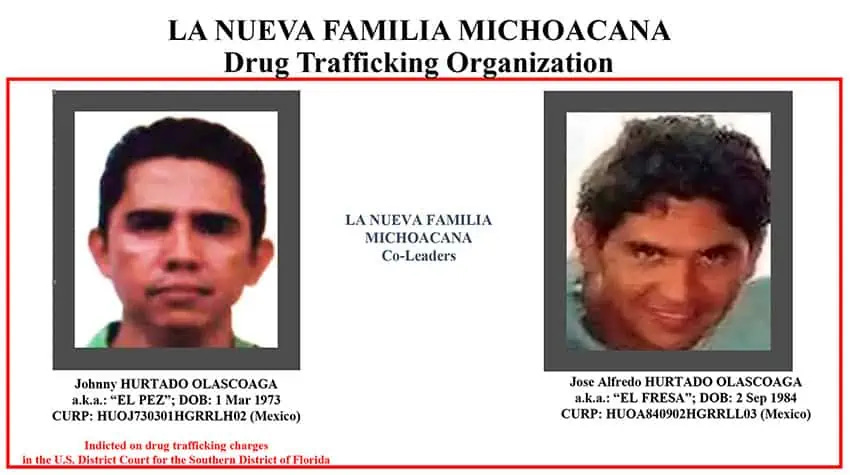From Cartels to County Lines
Inside the Federal Indictment Tying Mexico’s Drug War to Metro Atlanta
ATLANTA, GA — In a sweeping federal operation that spanned international borders and local neighborhoods, the U.S. Department of Justice announced the indictment of ten individuals linked to two of Mexico’s most violent and powerful drug cartels: La Nueva Familia Michoacana (LFM) and Cártel Jalisco Nueva Generación (CJNG).
At first glance, the press conference held by federal officials seemed like another headline in America’s long-running war on drugs. But for Georgia—particularly metro Atlanta—the details reveal far more: a deeply embedded criminal infrastructure, an evolving strategy by cartels to exploit U.S. financial systems, and a warning that even seemingly quiet suburbs and bustling urban counties like Fulton are not immune to the quiet reach of transnational crime.
A Tale of Two Indictments
The first indictment unsealed in the Northern District of Georgia targets Johnny and Jose Alfredo Hurtado Olascoaga, alleged co-leaders of La Nueva Familia Michoacana. Once splintered from the notorious La Familia Michoacana, the current iteration of the cartel is now classified by the U.S. government as a Foreign Terrorist Organization (FTO)—a rare designation for a drug trafficking group.
The indictment charges the brothers with overseeing the manufacturing and smuggling of large quantities of heroin, cocaine, methamphetamine, and fentanyl into the United States, including through Atlanta. The cartel’s reach spans over 35 cities in Mexico and numerous urban centers across the U.S., with Atlanta described as a “key distribution hub” according to the DEA.
In the second indictment, federal agents charged seven individuals in Norcross, Georgia—a suburb roughly 20 miles northeast of downtown Atlanta—with operating a money laundering scheme allegedly funneling over $1 million in drug proceeds back to Mexican traffickers. The structure was deceptively simple: a money service business called Lola Esperanza, run by Sandra Patrice Hernández Chuel and her daughter, allegedly served as a front to “clean” drug money using a tactic known as “smurfing”—dividing large sums into small transactions to avoid regulatory detection.
The Fulton County Connection: Infiltration Without a Footnote
While Fulton County is not explicitly named in the indictments, it’s impossible to ignore its centrality to the story.
Many of the cartel’s operations in Georgia revolve around the Atlanta metropolitan region, of which Fulton County is the economic and cultural core. The city of Atlanta, partially located in Fulton County, was referenced repeatedly as a major node in the cartel’s U.S. distribution network.
Given LFM’s documented history in Mexico of political infiltration—including bribing municipal officials, embedding allies in public institutions, and threatening non-compliant authorities—it is reasonable to suggest that similar tactics could be employed or attempted in U.S. jurisdictions where the cartel operates. This raises significant questions about the potential vulnerability of local, state, and county officials, especially in high-traffic drug corridors like Fulton County.
Criminal Infiltration: A Playbook with Local Stakes
Cartels like LFM and CJNG don’t merely deal in drugs—they specialize in systemic exploitation:
Bribery of public officials
Co-opting financial institutions
Infiltrating legal businesses with illicit proceeds
Using fear and violence to silence dissent
In Mexico, this has led to entire towns effectively controlled by criminal organizations. In the U.S., the tactics are more covert, but the goal is the same: destabilize oversight systems and ensure the uninterrupted flow of drugs and money.
What makes the Georgia case particularly alarming is the professional polish of the laundering operation. Lola Esperanza appeared to be a legitimate money service business, likely used by ordinary residents alongside cartel operatives. This "camouflage within the community" strategy allows criminal enterprises to operate in plain sight—an ominous sign for local governments trying to maintain transparency and accountability.
The Strategy Shift: From Street Dealers to Financial Crime
Federal officials repeatedly emphasized that this investigation was not just about drug seizures—it was about dismantling leadership and financial networks.
“When we take out their financial infrastructure, we effectively end their operations,” said Demetrius Hardman, Special Agent in Charge of IRS Criminal Investigation in Atlanta.
By targeting the money laundering apparatus, federal agencies are going after the "lifeblood" of cartel operations. But this also means agencies like the IRS, which historically focused on white-collar crime, are now on the front lines of narcotics enforcement.
The Bigger Picture: Domestic Frontlines in an International War
The case underscores a sobering reality: America’s drug crisis isn’t just a border issue—it’s local, financial, and deeply entrenched.
Atlanta, and by extension Fulton County, sits at the crossroads of major interstate highways, international airports, and diverse immigrant communities—all factors that make it appealing to traffickers. Add to that the presence of financial institutions and loosely regulated money transfer businesses, and the region becomes a prime staging ground for laundering illicit funds.
The federal indictments are a step forward. But they also raise vital questions:
How many other “legitimate” businesses are operating as cartel fronts?
Are local and state officials equipped—or willing—to confront potential infiltration?
Could future investigations reveal corruption or complicity within local government structures?
Looking Forward: Vigilance, Accountability, and Community Awareness
The fight against cartels is increasingly a fight for the integrity of local institutions. While there’s no public evidence yet of political infiltration in Fulton County, the risk factors are present, and the cartel’s methods are evolving.
As the federal government continues to apply counterterrorism tools—including OFAC sanctions, FTO designations, and multi-agency task forces—local governments must also evolve. That means:
Stronger financial oversight
Community engagement
Transparency in local governance
Support for whistleblowers and investigative journalism
This case is not just about drugs—it’s about whether American communities can resist the slow, quiet creep of transnational crime into their civic foundations.
If you see something suspicious involving money transfer businesses, drug activity, or corruption, you can contact the DEA tip line or report anonymously to the IRS Criminal Investigation division.


